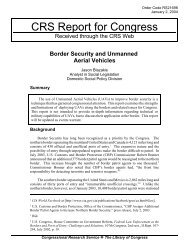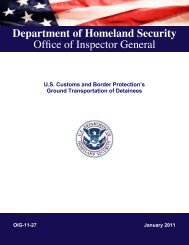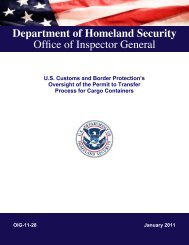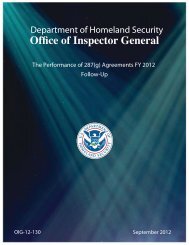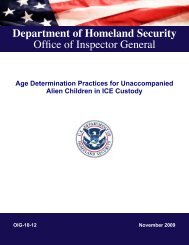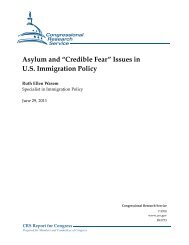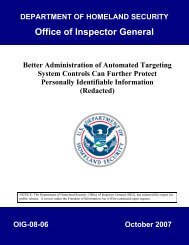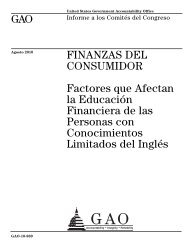Unauthorized Aliens in the United States - Federation of American ...
Unauthorized Aliens in the United States - Federation of American ...
Unauthorized Aliens in the United States - Federation of American ...
Create successful ePaper yourself
Turn your PDF publications into a flip-book with our unique Google optimized e-Paper software.
<strong>Unauthorized</strong> <strong>Aliens</strong> <strong>in</strong> <strong>the</strong> <strong>United</strong> <strong>States</strong><br />
would have applied for this registration, which would have been valid for six months. Registered<br />
aliens would have been eligible for a new “W” temporary worker visa established by <strong>the</strong> bill. To<br />
obta<strong>in</strong> a W visa, a registered alien would have had to apply at a consular <strong>of</strong>fice <strong>in</strong> his or her home<br />
country not later than six months after his or her registration was approved. The bill would have<br />
placed no numerical limit on <strong>the</strong> W visa.<br />
Under H.R. 4065, <strong>the</strong> <strong>in</strong>itial period <strong>of</strong> authorized admission for a W nonimmigrant would have<br />
been three years and could have been extended <strong>in</strong> three-year <strong>in</strong>crements without limit. The bill<br />
would have required that W nonimmigrants, except for spouses and children, be cont<strong>in</strong>uously<br />
employed but would have placed no restriction on <strong>the</strong> type <strong>of</strong> work <strong>the</strong>y could perform. W<br />
nonimmigrants would not have been prohibited from chang<strong>in</strong>g to ano<strong>the</strong>r nonimmigrant<br />
classification or adjust<strong>in</strong>g to LPR status, but H.R. 4065 would have made no special provision for<br />
<strong>the</strong>m to do so.<br />
The Comprehensive Enforcement and Immigration Reform Act <strong>of</strong> 2005 (S. 1438), also<br />
<strong>in</strong>troduced <strong>in</strong> <strong>the</strong> 109 th Congress, would have authorized DHS to grant a new status—Deferred<br />
Mandatory Departure (DMD) status—to certa<strong>in</strong> aliens, and to <strong>the</strong>ir spouses and children, present<br />
and employed <strong>in</strong> <strong>the</strong> <strong>United</strong> <strong>States</strong> s<strong>in</strong>ce before specified cut-<strong>of</strong>f dates. <strong>Aliens</strong> lawfully present <strong>in</strong><br />
<strong>the</strong> <strong>United</strong> <strong>States</strong> as nonimmigrants would have been <strong>in</strong>eligible. This bill would have placed no<br />
limit on <strong>the</strong> number <strong>of</strong> aliens who could have received DMD status. DHS could have granted an<br />
alien DMD status for a period <strong>of</strong> up to five years.<br />
<strong>Aliens</strong> <strong>in</strong> DMD status could not have applied to change to a nonimmigrant status or, unless<br />
o<strong>the</strong>rwise eligible under INA §245(i), to adjust to LPR status. <strong>Aliens</strong> who complied with <strong>the</strong><br />
terms <strong>of</strong> DMD status and departed prior to its expiration date would not have been subject to <strong>the</strong><br />
INA provision that bars previously unlawfully present aliens from be<strong>in</strong>g admitted to <strong>the</strong> <strong>United</strong><br />
<strong>States</strong> for 3 or 10 years (see “Inadmissibility” section, above). If o<strong>the</strong>rwise eligible, <strong>the</strong>se aliens<br />
immediately could have sought admission as nonimmigrants or immigrants, but <strong>the</strong>y would not<br />
have received any special consideration for admission. <strong>Aliens</strong> granted DMD status who failed to<br />
depart prior to <strong>the</strong> expiration <strong>of</strong> that status would have been <strong>in</strong>eligible for any immigration benefit<br />
or relief, except for specified forms <strong>of</strong> humanitarian relief, for 10 years. 42<br />
Conclusion<br />
It has been several years s<strong>in</strong>ce Congress considered immigration reform legislation, and it<br />
rema<strong>in</strong>s unclear whe<strong>the</strong>r <strong>the</strong> 111 th Congress will take up <strong>the</strong> issue. Compet<strong>in</strong>g legislative<br />
priorities, <strong>the</strong> 2010 midterm elections, and <strong>the</strong> state <strong>of</strong> <strong>the</strong> economy are all seen as obstacles to<br />
congressional action on immigration reform, especially if <strong>the</strong> reform packages under discussion<br />
<strong>in</strong>clude legalization for unauthorized aliens. Unemployment rates <strong>in</strong> <strong>the</strong> <strong>United</strong> <strong>States</strong>, <strong>in</strong><br />
particular, have been regularly cited <strong>in</strong> arguments aga<strong>in</strong>st tak<strong>in</strong>g steps <strong>in</strong> <strong>the</strong> near term to expand<br />
immigration. At <strong>the</strong> same time, advocates for immigration reform and legalization have<br />
42 Provisions establish<strong>in</strong>g a different version <strong>of</strong> DMD status were <strong>in</strong>cluded <strong>in</strong> S. 2611, as passed by <strong>the</strong> Senate <strong>in</strong> <strong>the</strong><br />
109 th Congress. <strong>Aliens</strong> who were unable to meet <strong>the</strong> presence and employment requirements <strong>in</strong> S. 2611 for adjustment<br />
to LPR status but who had been present and employed <strong>in</strong> <strong>the</strong> <strong>United</strong> <strong>States</strong> for a shorter specified period and met o<strong>the</strong>r<br />
requirements would have been eligible for DMD status. For additional <strong>in</strong>formation on <strong>the</strong>se provisions, see CRS Report<br />
RL32044.<br />
Congressional Research Service 19



